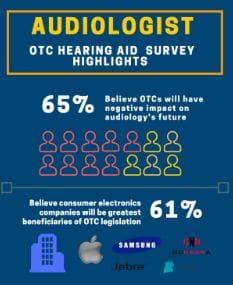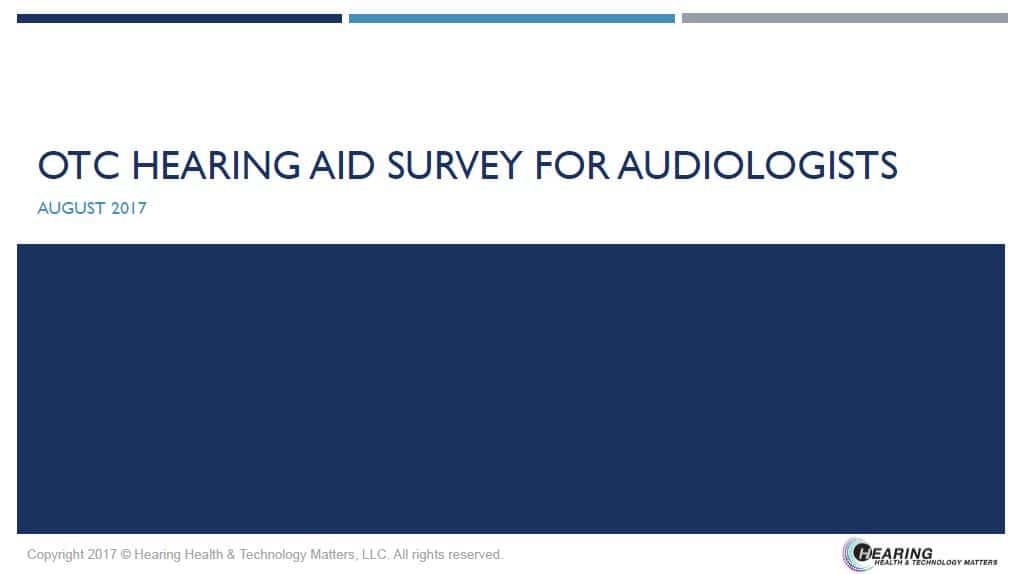TUCSON, ARIZONA — Hearing Health and Technology Matters (HHTM), a leading online resource on all topics related to hearing, has released the results of their Audiologist OTC Hearing Aid Survey.
The online survey was conducted between August 1st and August 8th, 2017, with the purpose of exploring the views of audiologists on the subject of Over-The-Counter (OTC) hearing aids. A total of 566 audiologists, based in the United States, completed the survey.
Audiologist Opinion on OTC Hearing Aids
Among the highlights of the survey results included:
- 65% of audiologists surveyed believe OTC hearing aids will have either a “negative” or “very negative” impact on audiology’s future
- Consumer electronics companies like Apple, Samsung, and others, were seen by respondents (61%) as being the greatest beneficiaries of the OTC hearing aid legislation that recently passed in the House and Senate
- 52% of audiologists surveyed felt that OTC hearing aids would likely hurt their clinic, compared with 9% that said OTC hearing aids would help their clinic
Comments received from survey respondents, totaling more than 95, were predominantly in opposition to the creation of OTC hearing aids:
“This is more about greed and consumer electronics companies wanting to get a piece of the action in something they know nothing about. This will create even a greater negative impact on hearing aids & has nothing to do with helping people in need. The cost excuse is bogus since hearing aids are readily available at a variety of price points.”
“Manufacturers can do a better job by lowering their cost as well. This shouldn’t be put solely on the audiologists. We are the professionals and taking the professionalism away makes the products look cheap all around. People do not understand the difference at all.”
“My primary concern with OTC devices is the potential for missed medical diagnosis including acoustic neuroma. I had a patient who used a OTC device for a bit, when unsuccessful finally ended up on my doorstep where he was identified with a large acoustic neuroma requiring skull based surgery. Post-surgery successfully fit with a bi-Cros device. He jokes when he came in to see me to “just get a hearing aid” he got way more than he bargained for. He is thankful he came in.”
However, not all comments were negative, there were many neutral and positive responses to the creation of an OTC hearing aid market as well:
“If the dispensing offices offer the OTC hearing aids as part of their service, I think it will have a positive impact. At least make options for the hearing impaired more visible.”
“I think that this is a very good opportunity, combined with the increased knowledge about the effects of untreated hearing loss, for audiologists to become the most knowledgeable professionals about OTC hearing aids, and to encourage patients to try them earlier than traditional hearing aids would normally be used. We have a great opportunity to expand access and decrease cost, and we should help our patients with hearing loss to understand the advantages and limitations of OTC hearing aids as one of many possible treatments to consider.”
“I plan on offering OTC aids in my office so patients have that option as well.”
OTC Survey Results
A shareable infographic highlighting results of the survey has been made available for anyone to share on social media and can be downloaded here.
A detailed PDF report of the survey results are now available for download:








There is a lot of fear here. This trend is inevitable and it will evolve as things usually do, in a different way than we expect. We present ourselves as caring professionals by dropping the fear and continuing to improve our services and products. We have tried, unsuccessfully, to get beyond the 10% of people who need hearing aids that actually wear them. Our professional focus is to help people with communication problems, and if some of the reluctant ones are first helped by approaching at an affordable level, we celebrate. As they warm to amplification, they will likely seek better technology and come to us. Keep up the faith and do right by everyone and it is a win/win!
OTC Eyeglasses did not kill the Eye Glass industry. Look around a crowded restaurant at the many people wearing perscription fit glasses and those wearing cheaters.
I believe that people want hearing devices that are comfortable, cosmetically appealing and that work in all listening situations. People also want someone to help them when the Aid does not work properly or when it breaks. People want quality and service from a professional well trained, educated and competent to assist them with their hearing needs. The best person is a Board Certified AUDIOLOGIST!
Good comments from the survey, especially the clear-eyed comments about the negative impact of the OTC experience on an already uneducated public. And trying to shoe-horn analogies between the eyeglass and hearing aid analogy in terms of impact on the market offer no cogent analysis. Going back to the basic but utterly misleading premise of pro-OTC arguments relevant to cost and access, OTCs will have no impact on either. Now, having said that, the comments by audiologists who advocated offering OTCs alongside their regular offerings are excellent–except that we need to realize that the ONLY thing that can make an OTC experience a happy one are the skills and services of the one dispensing them…by themselves they are nothing short of a facade, an uncomfortable mirage that may instead put off a decision just that much longer. Do I dare repeat it here that hearing loss and its neurophysiological and psychosocial and psychological implications is extremely more complex and involved than the more straight-forward issues dealing with vision loss? And where is the stigma in admitting visual impairments compared to the psychosocial stigma of admitting hearing loss? Even a bonafide audiogram doesn’t settle the argument in the mind of one lacking internal reference.
Nor does the inevitability of anything–war, recession, sickness, the cancer of illegal Internet hearing aids–does not mean that we should just cave in and embrace it. The China and Japan OTC experience with less than a 15% satisfaction rate on hearing aids because of the chaos with which they are strapped by this loony OTC logic is enough of a warning to the rest of us to not go there, no matter how “inevitable” it feels.
But it is heartening to see so many of our colleagues so clear-eyed about the issues, and also those who are trying their best to put a positive spin on it, because their leadership in their faulty judgement, gave them a lemon from which we now must all make a lemonade.
Those who know anything about the auditory system who understand the changing plasticity within the brain’s processing mechanism that needs to be addressed as adaptive assessments. The innocent wearer will not know about such changing neural mechanisms, and will most likely relegate the hearing aids to the drawers.
We see this happening many a time when audiologists fail to address adaptive issues, passing them off as ” you will get used to them, or, you get what you pay for.” Most hearing impaired patients lack motivation to go to a dealer audiologist, and are extremely reluctant to wear hearing aids. Lets see how it all pans out!